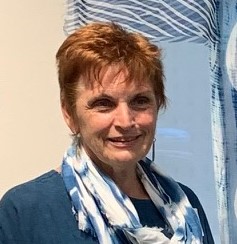

Today we’d like to introduce you to Suzanne Connors.
Suzanne, we appreciate you taking the time to share your story with us today. Where does your story begin?
Absolutely—though I’m not sure anything about my path has ever been “brief”!
I’ve always been drawn to textiles, pattern, and process—the slow, intentional rhythm of handwork. What began as a personal creative pursuit eventually evolved into a lifelong journey in fiber arts, surface design, and community building.
In 2008, I founded the Aya Fiber Studio in the creative town of Saxapahaw, North Carolina—a small personal space where I could immerse myself in the traditional dye techniques I loved. When I returned home to Stuart, Florida in 2014, I reopened Aya Fiber Studio at the Fish House Art Center in Port Salerno, never imagining how quickly it would grow.
What started as a small studio where I sold my hand-dyed shibori pieces soon blossomed into a national destination for fiber artists. Aya became more than just a studio—it became a creative hub and community, hosting multi-day workshops, open studio sessions, and exhibitions that celebrate the artistry and soul of textiles.
Beyond the studio, I’ve also worked to strengthen the broader fiber community as President of the South Florida Surface Design Association, helping organize exhibitions like Uncommon Threads, artist talks, and public programs that connect and inspire regional artists.
Now, after nearly two decades of nurturing that vision, I’m entering a new chapter. I’m in the process of transitioning Aya Fiber Studio to new ownership—someone who shares its spirit—while I focus on my next venture, Aizome Studio | Suzanne Connors, devoted to Japanese indigo, shibori, katazome, and cultural textile retreats in Japan.
It’s been an incredible evolution—from teaching and curating to mentoring and now storytelling through travel. Every part of this journey has been about connection—between artist and material, between tradition and innovation, and between cultures that share a profound respect for the art of the handmade.
We all face challenges, but looking back would you describe it as a relatively smooth road?
Like most creative paths, it’s been anything but smooth—but I wouldn’t trade a single bump for what I’ve learned along the way.
Building Aya Fiber Studio from the ground up was a huge leap of faith. When I opened the doors, I was creating something that didn’t really exist in South Florida—a fully equipped fiber-arts studio that could host nationally recognized instructors and serve as a retreat-style destination for artists. There was no roadmap. Every detail—from finding the right space and equipment to learning the logistics of running multi-day workshops—was a learning curve.
Then, of course, came the pandemic. For a studio built on in-person collaboration, that was a huge challenge. I had to rethink everything—postpone workshops, refund deposits, and keep our community connected from a distance. It tested my creativity and resilience in new ways.
There have also been the everyday realities of running a small arts business—rising material costs, international shipping delays, tariffs on imported silks and Japanese supplies, and the constant balance between creative time and administrative work. But through every obstacle, I’ve been reminded how strong this community really is. The support from students, instructors, and fellow artists kept Aya alive—and thriving.
On a more personal note, the last few years have also brought profound personal loss, and that shifted my perspective completely. It reminded me that life is fragile and that our creative work can be a source of deep healing. Those experiences ultimately led me to refocus on what matters most: creating, teaching, and traveling in ways that align with my heart and my heritage in Japanese textile traditions.
So no—it hasn’t been a smooth road. But every challenge shaped the next chapter, and I’m grateful for all of it.
Can you tell our readers more about what you do and what you think sets you apart from others?
At my core, I’m a fiber artist and educator who works primarily with traditional Japanese surface-design techniques—indigo dyeing, shibori, and katazome—interpreted through a contemporary lens. My practice revolves around the beauty of process: folding, stitching, binding, layering, and dyeing cloth until it carries a story of both discipline and spontaneity.
I’ve spent years studying the traditions of Japanese textiles, and I’m deeply committed to keeping those techniques alive while adapting them for modern makers. I’m particularly drawn to indigo—the color, the chemistry, and the ritual of the vat itself. It’s an ancient process that connects you directly to the earth and to centuries of artisans who have come before.
Through Aya Fiber Studio, I’ve had the privilege of creating a space where artists from across the country can gather, learn, and share. We’ve hosted master instructors from around the world, and I’ve watched hundreds of students find their creative voice through fiber. That sense of community and mentorship is something I’m incredibly proud of—it’s really what sets Aya apart. It’s not just a studio; it’s a place of transformation.
What also distinguishes my work is the balance between tradition and innovation. I honor the roots of every technique I teach, but I encourage students to make it their own—to combine methods, push materials, and find their personal rhythm.
Now, with Aizome Studio, my focus is expanding beyond the walls of Aya. I’m developing textile-based travel retreats in Japan—immersive experiences where participants work alongside local artisans in regions like Tokushima, Takayama, and Shiroko. These journeys allow artists to see where the traditions come from, meet the craftspeople who sustain them, and experience firsthand how culture, landscape, and craft are inseparable.
What I’m most proud of, though, is that everything I do—whether in the studio or abroad—builds connection. Between artist and fabric. Between teacher and student. Between old and new. It’s about honoring beauty, process, and community in equal measure.
Networking and finding a mentor can have such a positive impact on one’s life and career. Any advice?
Absolutely. I think the most meaningful connections come when you approach people with curiosity and genuine respect—not just for what they make, but for how they make it. In the fiber arts, mentorship isn’t always formal; sometimes it’s simply sitting beside someone, watching their hands work, and asking thoughtful questions.
Early in my journey, I made it a point to take workshops from artists I admired—not just to learn their techniques, but to understand their philosophy, their way of seeing. Over time, those relationships evolved naturally into mentorships and friendships. Many of the world-class instructors who later came to teach at Aya Fiber Studio started as my own teachers. That exchange—learning from one another, then lifting each other up—is the heartbeat of this community.
Networking, to me, isn’t about collecting contacts—it’s about building relationships rooted in generosity and authenticity. I always tell emerging artists to show up: attend exhibitions, volunteer, join professional organizations, and say yes to opportunities where you can contribute. When people see your enthusiasm and reliability, doors start to open organically.
And perhaps most importantly—become the mentor you wish you had. Share your knowledge freely, encourage others, and celebrate their successes. The creative world thrives on collaboration, not competition.
For me, the relationships built through the studio—students, instructors, visiting artists, and fellow travelers—have become an extended family. That sense of connection has been the greatest gift of all.
Pricing:
- Workshops at Aya Fiber Studio (Stuart, FL) One-day classes start around $180–$250 (materials additional) Multi-day master workshops with visiting instructors typically range $475–$950, depending on duration and instructor Materials fees are usually $25–$60, depending on the technique and fabric type
- Open Studio Sessions Drop-in rates: $40 for a half-day / $60 for a full day Includes access to professional dye kitchen, print tables, and equipment
- Aizome Studio | Textile Travel Retreats (Japan 2026–2027) Immersive two-week programs featuring artisan-led workshops and cultural experiences Pricing begins at approximately $5,800–$6,800 per person, depending on itinerary, lodging, and exchange rates Includes accommodations, in-country transportation, several workshops, and most meals
- Each experience is designed to be hands-on, immersive, and community-driven. Whether someone is joining us for a single workshop or an international retreat, they’ll leave with new skills, new friendships, and a renewed sense of creative purpose.
Contact Info:
- Website: https://www.ayafiberstudio.com
- Instagram: https://www.instagram.com/ayafiberstudio/
- Facebook: https://www.facebook.com/ayafiberstudio
- LinkedIn: https://www.linkedin.com/company/aya-fiber-studio
- Youtube: https://www.youtube.com/@ayafiberstudio8925
- Yelp: https://www.yelp.com/biz/aya-fiber-studio-stuart-2
- Other: https://www.facebook.com/profile.php?id=61580404220286 (Aizome Studio | suzanne Connors)
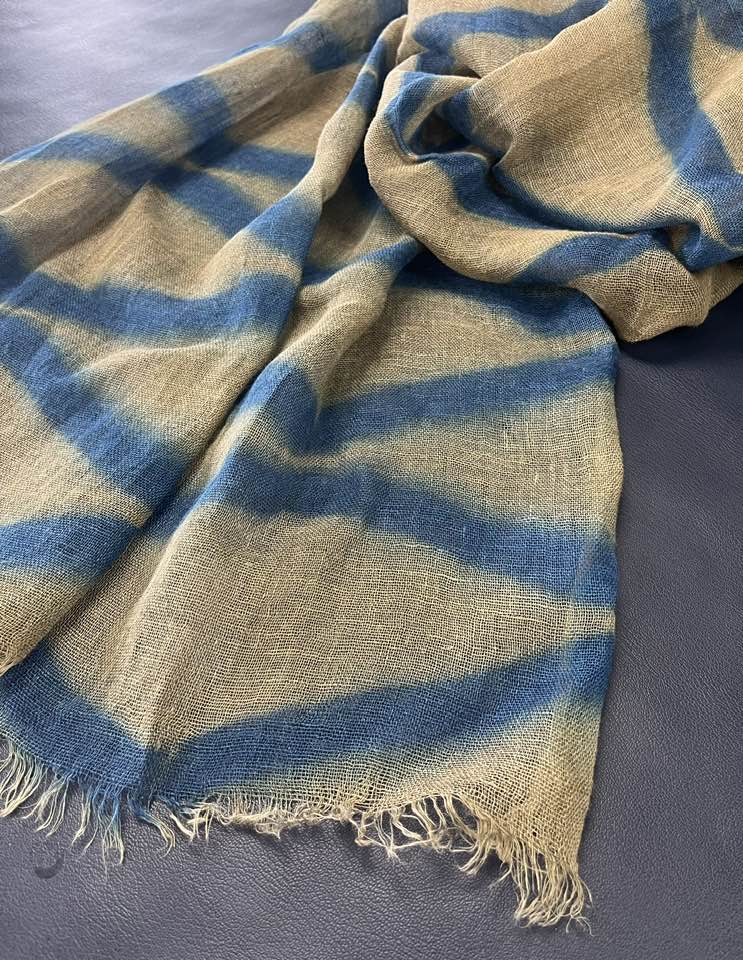
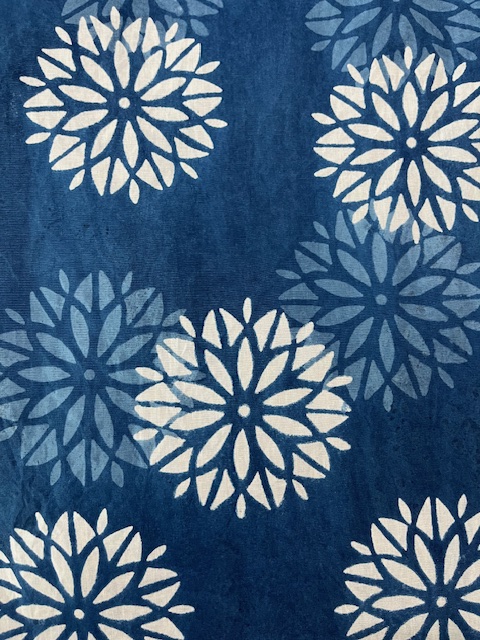
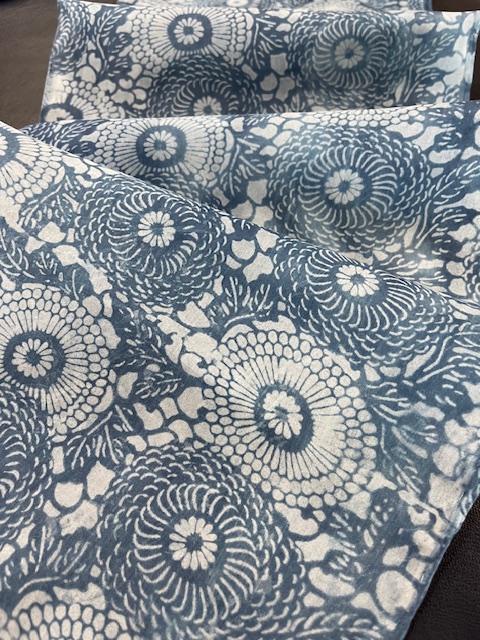
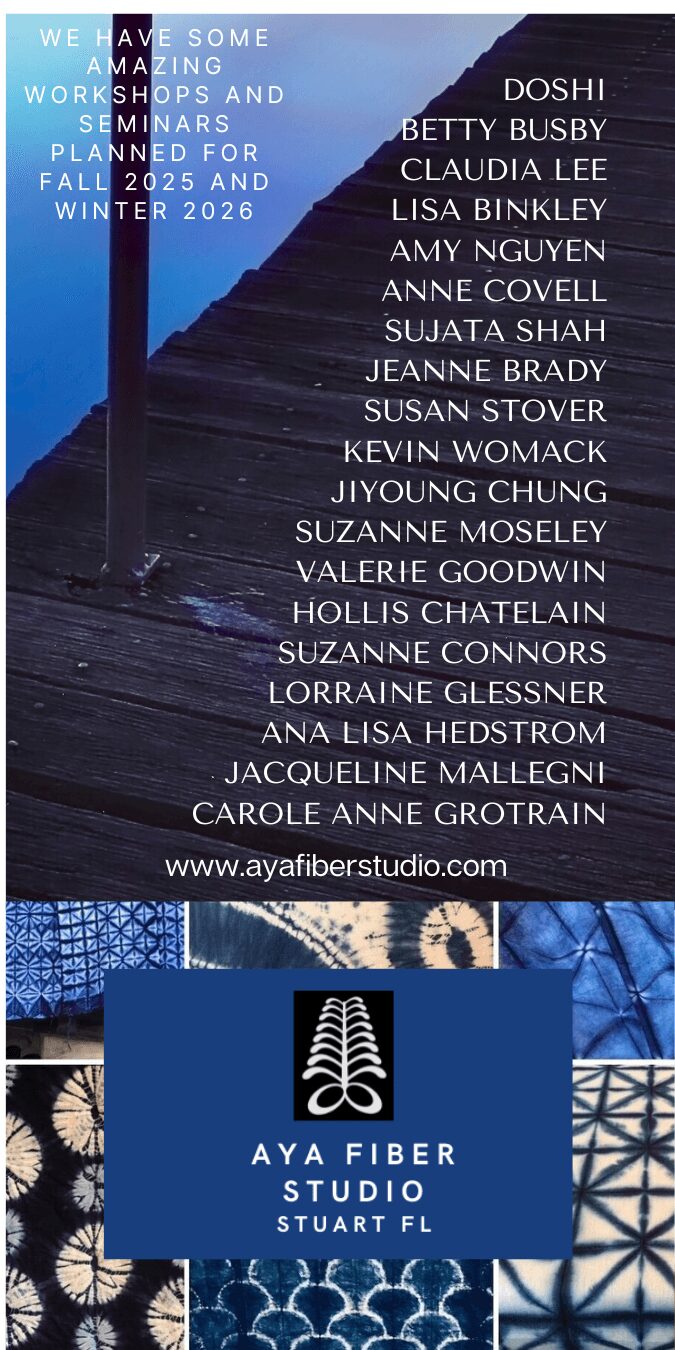
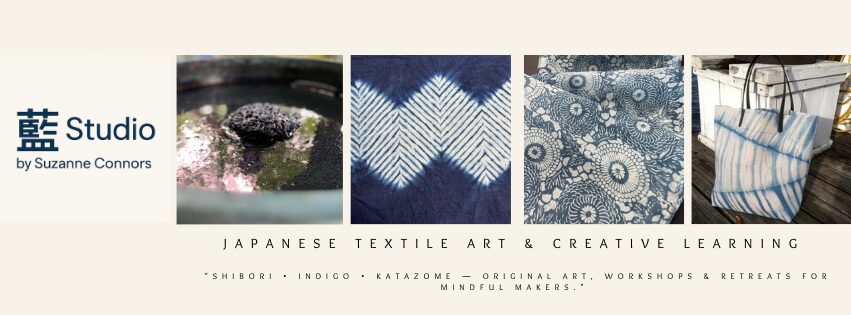
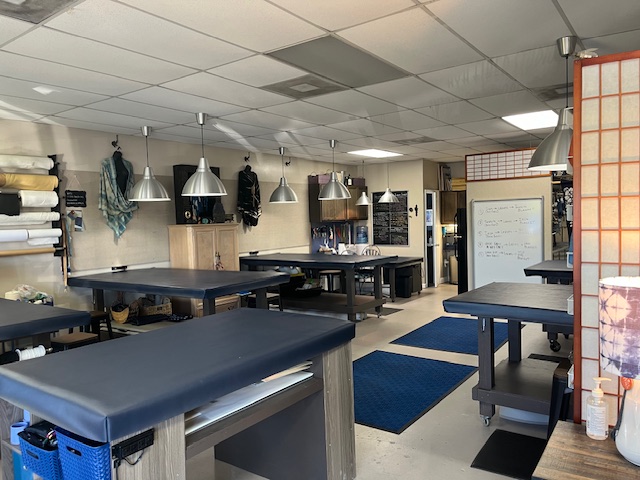
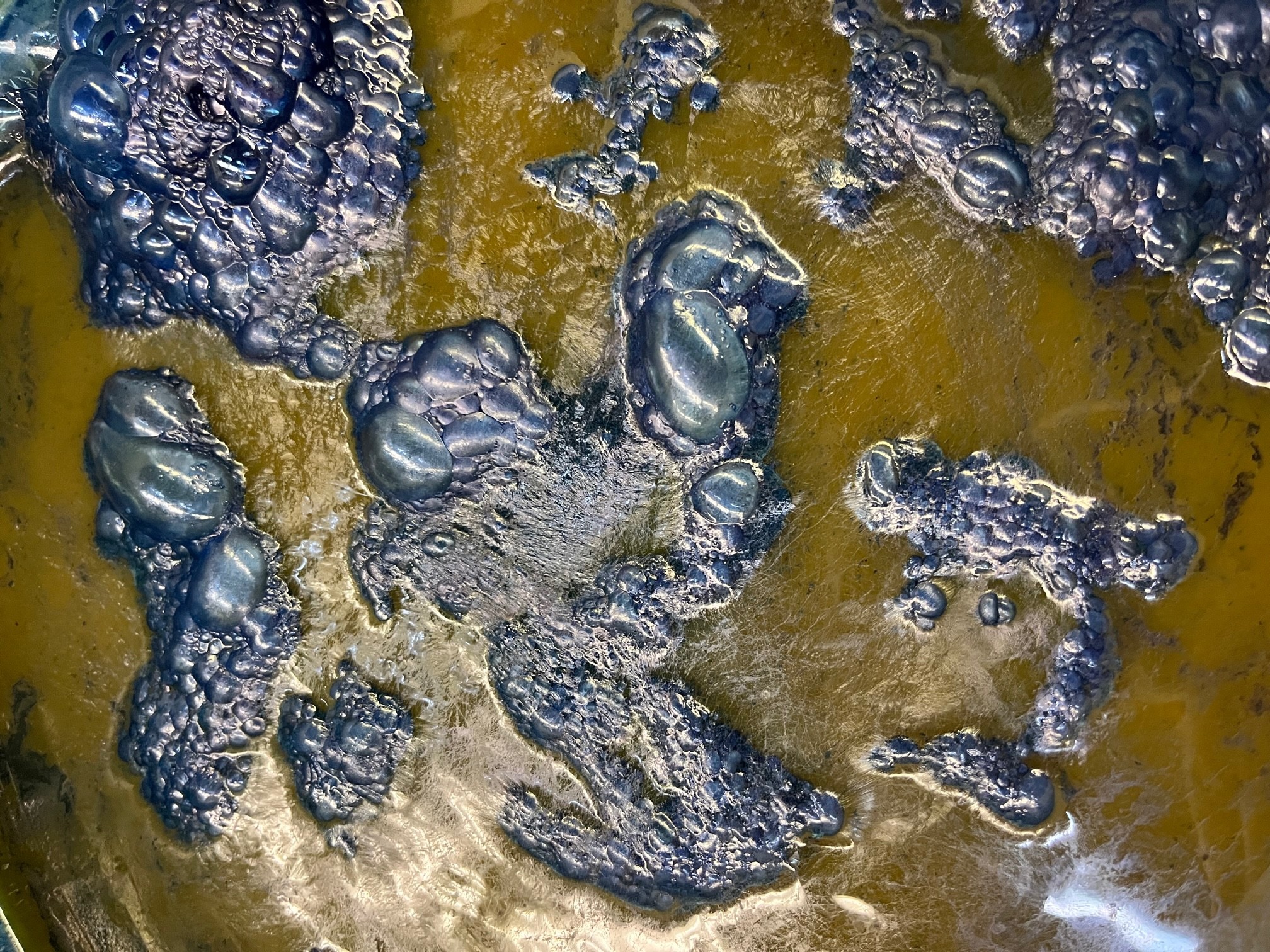
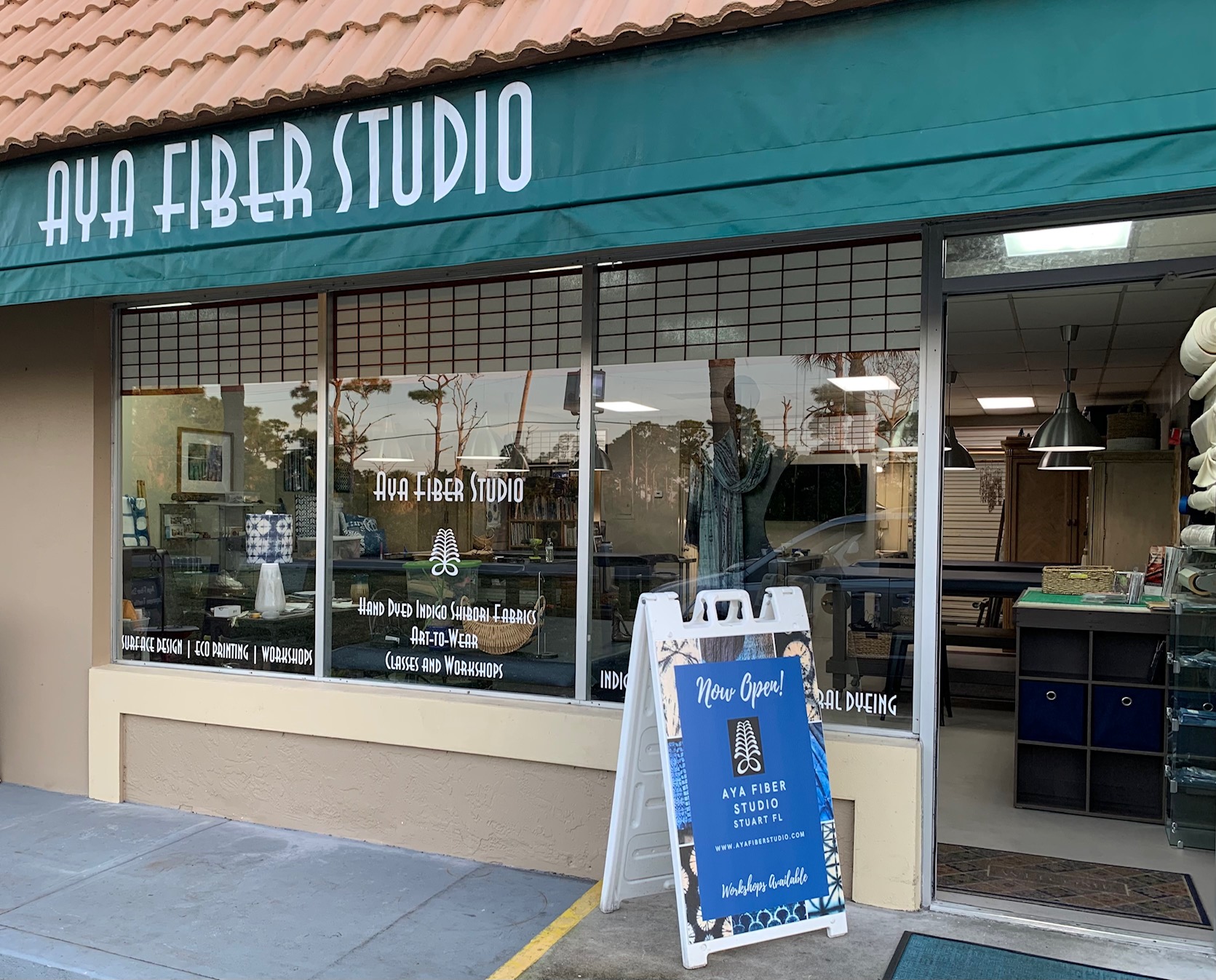
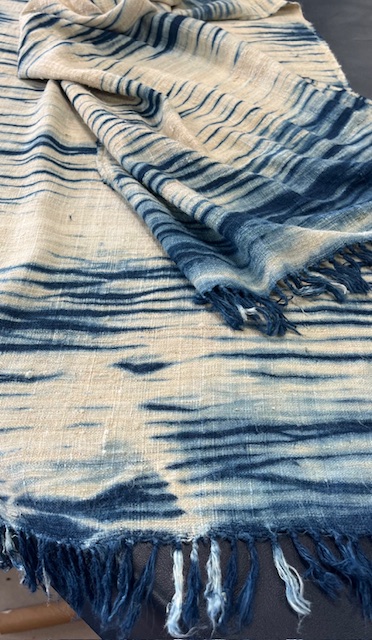
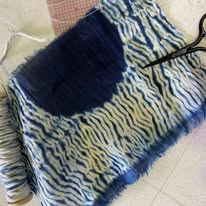
Image Credits
Suzanne Connors












